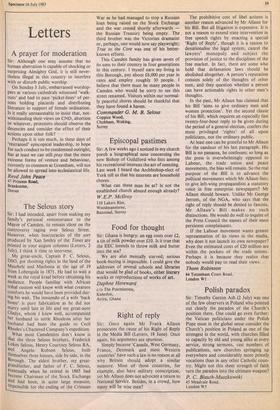Right of reply
Sir: Once again Mr Frank Allaun prosecutes the cause of his Right of Reply in the Media Bill (Letters, 18 June). Once again, his arguments are spurious.
Simply because 'Canada, West Germany, France, Denmark and most Western countries' have such a law is no reason at all why Britain should adopt a similar measure. Most of those countries, for example, also have military conscription, yet Mr Allaun does not advocate a return to National Service. Besides, in a crowd, how many will be wise men? The prohibitive cost of libel actions is another reason advanced by Mr Allaun for his Bill. But all litigation is expensive. It is not a reason to extend state intervention in free speech rights by enacting a special 'Right of Reply', though it is a reason to denationalise the legal system, cancel the lawyers' monopoly and subject the provision of justice to the disciplines of the free market. In fact, there are some who hold that defamation laws should be abolished altogether. A person's reputation consists solely of the thoughts of other men, and they question whether a person can have actionable rights in other men's thoughts.
In the past, Mr Allaun has claimed that his Bill 'aims to give ordinary men and women protection'. Yet the second clause of his Bill, which requires an especially fast twenty-four-hour reply to be given during the period of a general election, confers the most privileged 'rights' of all upon politicians, not the ordinary public.
At least one can be grateful to Mr Allaun for the candour of his last paragraph. His Bill is no panacea, he confesses; so long as the press is overwhelmingly opposed to Labour, the trade union and peace movements, the bias will remain. So the real purpose of the Bill is to advance the political movements which Mr Allaun lists; to give left-wing propagandists a statutory voice in free enterprise newspapers? Mr Mann should beware. Unlike Mr George Jerrom, of the NGA, who says that the right of reply should be denied to fascists, Mr Allaun's Bill makes no such distinctions. He would do well to inquire of the Press Council the names of their most persistent complainants.
If the Labour movement wants greater representation of its views in the media, why does it not launch its own newspaper? Even the estimated costs of £20 million are within the pockets of the trade unions. Perhaps it is because they realise that nobody would pay to read their views.
Thom Robinson
84 Tottenham Court Road, London WI






































 Previous page
Previous page